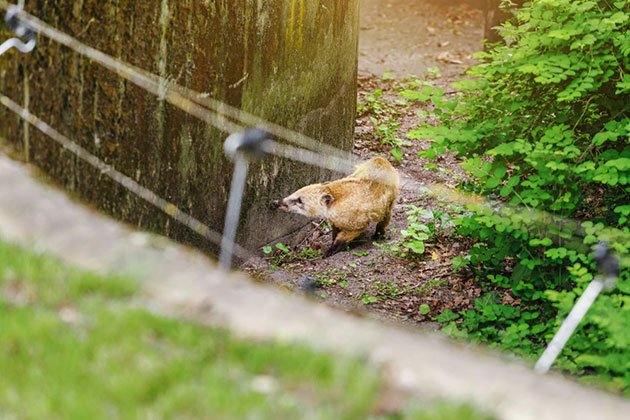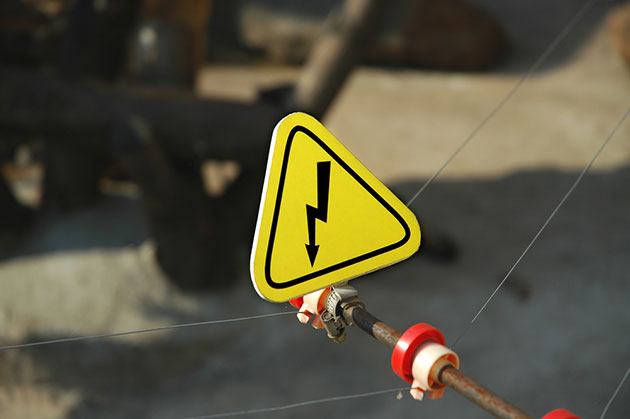Raccoons are nocturnal animals known for their crafty way of sneaking up in the night and destroying all your hard-labored crops.
Logically, you cannot get up every night and chase them away.
Their persistent nature will have them coming back for more and more if they find a way to enter your garden quickly.
Therefore, the only intelligent solution to keeping raccoons away is an electric fence for raccoons.
N0t only teaches them a lesson, but it will restore your night’s sleep knowing that your crops are safe!
Understanding Raccoon Behavior

It would be wise to get to know them before you start building electric fencing to fight off these pesky animals.
Now, that does not mean you should adopt them as a pet, but understanding their behavior can help you in the long run.
By learning about their daily needs, hunting skills, and interactions with humans and other animals, you will know how to build a quality defensive system.
Although they are intelligent creatures, they can be a nightmare to many homeowners. You will usually spot them in the middle of the night, hovering over a trash can searching for food.
Along the way, they destroy your gardens’ exterior and your hardworking crops as well!
They prefer heavily woody areas and are often found in abundant vegetation, water, and trees.
Talk about persistence; these small animals are willing to travel up to 18 miles just searching for food!
Due to their adaptive nature, raccoons are found in urban and suburban areas where they built homes in barns, attacks, and even sewers.
Raccoons are nocturnal and are most active in spring, fall and summer.
They have a diversified diet, making them a significant threat to farmers! Once they get a hold of any food they can get their paws on, nothing is off-limit.
Additionally, raccoons have excellent dexterity, making them available to open doors, jars, and even gates.
Plus, they are excellent climbers, which is why you need to get rid of any trees near the electric fencing.
You see now why they are every farmer’s nightmare?
How to Identify a Raccoon Invasion?
These small nuisance animals can be highly destructive. But, it’s not that easy to spot a raccoon invasion in your garden.
Here are a few signs indicating a raccoon problem.
- Empty birdfeeders
- Dug up holes in the lawn or the garden
- Knocked over trash cans
- Damaged drops, especially sweet corn
- Raccoon tracks
So, is there anything to be done in this situation?
One of the most effective methods to keep raccoons away from your property is by installing an electric fence.
They will oppose a physical and a mental barrier for these small animals and keep them away from your yard.
Raccoons can be persistent, so installing an electric fence is not only recommended but necessary!
What Is the Best Electric Fencing for Raccoons?

With electric fencing, you have a variety of choices.
You can go with temporary or permanent physical barrier fences. When dealing with the raccoon problem, I recommend going with temporary fences.
Since raccoons invade only during spring, summer, and fall, you will move the fence line seasonally.
The Zareba KGPACZ AC Garden Protector Electric Fence Kit and Gallagher Garden & Backyard Protection Kit are other reliable choices.
With the Gallegher kit, you need to be careful of the vegetation not to short out the wire.
To stop raccoons and protect the livestock and crops, you will need to build electric fencing at least 15 cm above the ground.
The ground wire should measure out 5 cm while the hot wire is around 10 inches higher.
On the other hand, the Zareba protector uses a one-strand mechanism to cover a large field.
All in all, the final choice will depend on your budget and perimeter needs.
Keeping raccoons away permanently is only possible with electric fencing, so you won’t make a wrong choice with either of the fences.
Temporary Electric Netting
Electric netting can be installed with step-in line posts and is one of the most effective ways of keeping your yard raccoon-free!
They can be placed around desired gardens, crops, and flower beds.
One of the best things about electric fence netting is that it can be combined with multiple nets to create a large fence barrier.
Additionally, this fence can be powered with 110V fence chargers.
Here, you can use solar or electric energizers. But, of course, it all depends on your budget.
Electric wires of the netting can be installed along the existing fence to match the height. As you know, raccoons are excellent climbers, so building a tall fence wire will be necessary.
These electric fences are user-friendly, even for first-time users. Unroll it from the box, and it’s ready for installation.
The effectiveness is seen right away, as intruders act as a physical and mental barrier.
Before ordering a net, you will need to measure out the fence line post. If your fence measures out at 200 ft, you will need approximately 200 ft of netting.
Remember to get it with the electrifying kit!
How to Build an Electric Fencing for Racoons?

Measure out the perimeter of the electric fencing area.
Since electric wires come in various lengths, it will be easy to cover the entire lawn or garden from wildlife intrusion.
Next, you need to install the corner fence rods at least one foot deep. Cover the rods with insulators around five inches from the ground.
When choosing the best electric wire for the task, tie the wire to the insulator and thread it through the other insulators on the rods.
After so, attach an electric or battery-powered charger to the wood post and a fence wire.
Your next step is installing the ground rods and checking the voltage of the electric fence.
A fence for raccoons and other smaller wildlife animals needs quality construction.
You need to space one wire around 4-6 inches above the ground level. Additionally, clearing out any vegetation, such as weeds, is crucial!
Also, you can use a low-impedance charger in these situations.
As for the fence line posts, they need to be at least 5-12 feet apart. Again, the lower the wires are to the ground, the better they will protect your crops from smaller animals.
Extra Tip: Install a chicken wire fence inside the electric fence to warn the wildlife creatures.
Calling Reinforcement to Help
Installing an electric fence to keep raccoons and wild animals away is effective, but can you reinforce the protection system even more?
You sure can! Here are the top tips you can try along with the fencing.
- You have probably heard that raccoons detest the smell of apple cider vinegar? Well, it’s true!
- Therefore, you can try soaking up a cloth in apple cider vinegar and hiding it in critical areas. By critical, I mean around the trash can and sweet corn. Those are the weak spots of every raccoon!
- Keeping the radio on in the garden or fence perimeter will also scare some intruders away. The human voice on the talk radio will have some wildlife creatures wondering if they are truly alone in the garden.
- You can also try installing a so-called ‘scare-light.’ It goes off by a motion sensor that repels raccoons, rabbits, foxes, or other digging intruders.
- Lastly, remember not to leave any food in the garden or near the house. Pet owners often forget about this and leave out food for their cats or dogs. However, raccoons and other small wildlife animal species will sneak their way into the food.
- Make sure you cut up any tall branches and trees that may be a climbing opportunity for the raccoons.
Trapping Raccoons

Many farmers and homeowners tend to trap raccoons after being shocked by the fence.
However, since these intruders can get aggressive at times, especially when they feel in danger, it’s best to leave trapping to professionals.
However, if you wish to trap them, it’s best to use a metal trap cage.
Additionally, you can use food bait such as sweet corn, vegetables, and fruits. Make sure the trap is positioned correctly for a successful capture.
Check your trap once in a while.
The trapping process may take up to a few days or so to trap a raccoon, but they should not be kept there for an extended time! Releasing them into the wilderness is the best solution.
But, as trapping raccoons is illegal in some areas, check your location’s regulations beforehand.
FAQ’s
Does electric fence work for raccoons?
Yes, electric fences effectively keep raccoons away, as long as they are built properly.
Electric fences need to be built with wires low to the ground to keep these small wildlife animals from digging underneath.
One of the best electric fences is a net. It can quietly be relocated when the electric netting is installed as it is a part of the temporary fencing system that works for all gardens!
It can be installed in the yard, lawn, or fences to keep the pests away.
How do you make an electric fence to keep raccoons away?
For starters, you will need to choose the right type of electric fence.
Electric netting fences are the best recommendation that keeps away raccoons, opossums, rabbits, and alike from the garden.
When purchasing this type of fence, you need to get a full kit that includes an energizer to electrify the fence.
Next, upon installment, it’s best to keep the wire at least 4-6 inches above the ground level. This will prevent the intruder animal from digging under the wires and shock them if they try to.
How do you install an electric fence for raccoons?
You need to know that raccoons are not stopped with regular electric fences, for starters. This animal is known for its climbing skills and will deliver its best endeavors to climb up the fence.
Therefore, installing a fence with wires at least 6 inches above the ground is necessary. Also, add one wire or two strands at least 8 inches from the ground and 8 inches from the fence.
Note that the posts need to be at least 12 feet apart when installing the fence for raccoons. Clear away any vegetation that may interfere with the electric charge.
How high of a fence can a raccoon climb?
Raccoons are deterrent animals, and once they set their eye on a prize, nothing can stop them. They are known for their ability to jump high, swim, leap and run.
Excellent speed is another close talent, so catching them can be almost impossible.
They can climb up to a great height, so it’s necessary to cover the fence posts fully. If they see an opportunity for a climbing adventure, they will take it!
An adult raccoon can jump approximately 5 feet high from the ground. But, surprisingly, they don’t get hurt when they fall from a great height due to their protective coat.
Conclusion
Sometimes, installing an electric fence for raccoons is inevitable if the raccoon invasion gets out of hand!
Nonetheless, it’s a safe yet effective way to protect your garden crops and livestock from intruders.
Raccoons can get persistent if they spot an easy way in your yard.
Therefore, learning all you can about their behavior, eating habits, skills, and hiding places will help you build a better fence.
Remember to clear any tall branches, trees, posts, and others that may allow raccoons to climb around the fence.
We hope we have helped you learn what it takes to get rid of raccoons once and for all!
With these few tips and tricks you can use and electric fencing, no small intruder will ever come near your crops!

Hi, I want to protect a cat house from racoons and other predators. Unfortunatelly, I can not put grounding rod in the very rocky soil. Can I just run ground and hot wires paralel to each other without grounding rod. Space between would be about 6″ between. When the racoon tries to climb up will touch both the wires.